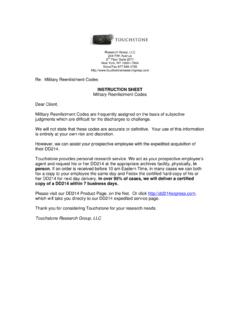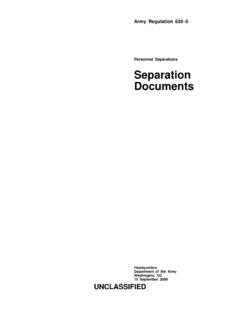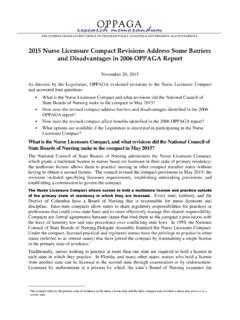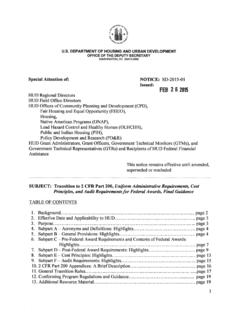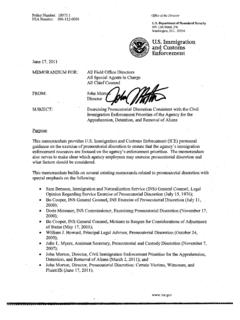Transcription of BASICS OF DISCHARGE UPGRADING
1 BASICS OF DISCHARGE UPGRADING (This was written by Tom Turcotte, a San Francisco lawyer, who is a part-time staff attorney at the non-traditional veterans' organization Swords to Plowshares. Tom also has a private practice of his own thatincludes DISCHARGE Review and Correction Board work)Advocates of active duty military members will deal with people in situations that inevitably result in the receiptof a less than fully Honorable DISCHARGE . There is, and has always been a great deal of misinformation BASICS OF DISCHARGE UPGRADING (This was written by Tom Turcotte, an attorney in San Francisco, who is part-time staff attorney for the non-traditional veterans organization Swords to Plowshares. His private practice includes DISCHARGE review andBoard for Correction of Military Records work.)Advocates of active-duty military members will deal with people in situations that inevitably result in the receiptof less than fully honorable discharges.
2 There is, and always has been, a great deal of misinformation regardingthe process and standards in the military s system for reviewing less than fully Honorable DISCHARGE imposes significant limitations on veterans VA benefits entitlement andemployment opportunities. This article is intended only to provide a very basic overview of the DISCHARGE review system and provide somepractice pointers for advocates. Nothing is intended to impart specific advice to any individual's situation nor isanything discussed regarding federal court review of Less-Than-Honorable Discharges or correction of militaryrecords. I. The DISCHARGE Review and Correction BoardsThere are two separate Boards for each service branch that reviews discharges -- The DISCHARGE Review Boardand the Board for Correction of Military/Naval DISCHARGE Review Boards consist of five officers, of the rank 0-4 or higher.
3 These Boards have jurisdictionover discharges issued within fifteen years of the date of application. The Review Boards cannot review a BadConduct or Dishonorable DISCHARGE issued as part of the sentence of a General Court-Martial, but they canreview all others including Bad Conduct Discharges issued as part of the sentence of a Special-Court Martial. The Review Boards are empowered only to upgrade the type of DISCHARGE and change the reason fordischarge. They cannot change a re-enlistment code or otherwise modify the contents of a vet's military can elect either a personal appearance type of hearing before the Review Boards or a non- personalappearance review that is limited to consideration of available medical and administrative records as well as anymaterials submitted by the applicant can first apply for a non-appearance type of hearing and, if that is not successful, then ask for apersonal appearance type of hearing.
4 Statistically, personal appearance type hearings stand a much better often advise clients to try the non-appearance mode first, then, if that s not successful, ask for a personalappearance. This gives the vet two bites at the apple. A personal appearance type of hearing must be madewithin fifteen years from DISCHARGE so that deadline has to be considered first and LAW TASK FORCE OF THE NATIONAL LAWYERS GUILDDISCHARGE UPGRADINGAND DISCHARGE REVIEW318 Ortega StreetSan Francisco, CA 94122 INTRODUCTORY MATERIALS & ATTORNEYS AND The Army and Air Force Review Boards travel regionally to certain locations in the continental states. (LosAngeles and San Francisco are two cities they go to in California.) Often, the Boards will send one officer whois designated as a Hearing Examiner. This officer will conduct a videotape of the hearing that will be playedback to a full panel of the Board in the Washington, , area for final decision.
5 Sadly, and perhaps illegally,the Navy DISCHARGE Review Board does not travel regionally. Navy and Marine vets can only elect a personalappearance type hearing in Washington, the personal appearance type of hearing, a Review Board allows an applicant to be represented by lawyeror non- lawyer counsel. An opening by counsel is generally made, as is direct questions of the applicant bycounsel, then followed by questions from the Board members and a closing statement by counsel. Witnesses canalso testify at to the Review Boards are made on DD Form 293. The form asks the veteran to list specific issues insupport of an upgrade that the Board will consider and resolve. (NOTE: Any search engine will produce theReview and Correction Boards web sites -- just enter DISCHARGE Review Boards. These sites includeregulations, application forms that can be downloaded and FAQ s, etc.)
6 For each Board and branch of to regs are not made here because they are available on the Boards for Correction of Military/ Naval Records consist of high ranking civilian employees of eachbranch. These Boards have almost complete power to change, delete, modify or add to the contents of militaryrecords. Application to a BCMR requires completion of DD BCMR s can do anything to a vet s records except overturn a court-martial are not required to grant personal appearance hearings though they can but very rarely do. They sit only inWashington the Review Boards, (which operate under a fifteen year limit from the date of DISCHARGE that cannot bewaived), the Correction Boards operate under a three year limit for application that starts upon the date of discovery of alleged error or injustice. This date is generally by the Correction Boards to start as of the date ofdischarge or, in the case of a denied upgrade from a DISCHARGE Review Board, the date of the Review , the Correction Boards can, and often do waive the three year limit if they determine that it is in theinterest of justice to do so.
7 They cannot determine whether to waive the three year limit without making acursory review of the merits of a often argue that they were never advised of the existence of the Boards, let alone their time limits. Thisargument cannot hurt but I have never really seen it work either because ignorance of the law is no excuse andbecause since 1975, vets being separated Less-Than-Honorably are required to be given a fact sheet regardingthe Review and Correction Boards' powers and application time is best to simply argue that the merits of the case warrant waiver of the three-year limit. The application form(DD 149) actually requires explanation as to why the Board should find it in the interests of justice to waive thethree year limit if the application is made past three years from the date of discovery of error or medical or legal issues are involved in a Correction Board application, the Air Force will ask for advisoriesfrom the SJA or Flight Surgeon.
8 Other branches rarely do this but one can always ask for an advisory provided arequest to review and rebut the advisory before a hearing is also the Correction Boards cannot overturn a Court-Martial conviction as a mater of law, they can, andsometimes do order that the records be corrected to show that the Convening Authority approved only part of asentence but not a punitive Board decisions are binding on all federal agencies including the Department of Veterans is crucial in General Court-Martial cases because a DISCHARGE as part of the sentence of a General Court-2 Martial is an absolute statutory bar to VA benefits. If a Correction Board orders a change in the ConveningAuthority s review and changes the reason for DISCHARGE from sentence of a GCM to action by the CorrectionBoard -- the DISCHARGE no longer is the result of a General Court-Martial which eliminates the bar to VAbenefits.
9 (VA benefits are discussed in a little more detail below.)II. Some Myths about Bad Paper It is absolutely not true that a Less-Than-Honorable DISCHARGE automatically gets upgraded six months afterdischarge. This myth has been around since World War II and is still being perpetuated by people marginallyinvolved in the DISCHARGE process such as personnel specialists and NCO s. Typically, a vet will explain that: They told me so long as I kept my nose clean the DISCHARGE would go to Honorable in six months. Advocates should make it clear that this just not true!My theory after nearly thirty years of doing this work is that the six month myth is grounded partly in the factthat military regs used to require that administrative records not be forwarded to the Records Center in St. Louisuntil six months after separation. I suspect that this is where the six-month aspect of the myth comes from.
10 I think the real reason this myth is still being perpetuated is that it deceives young people who are already undergreat stress believing that they need not use any rights they may have in the DISCHARGE process because, afterall- it s gonna get upgraded anyway . The FAQ part of the Army Review Boards' website actually includes debunking of the six month myth. That ishow common this mean little bit of misinformation myth is that regardless of the reason for DISCHARGE or what is in one s disciplinary record, a dischargeupgrade will obtain long as an excellent post- DISCHARGE history can be service history, no mater how laudatory and well documented is simply not a ground for upgrade. I believethat documenting post- service is a good idea because the Board members may use that evidence to sway themto the applicant s advantage.



